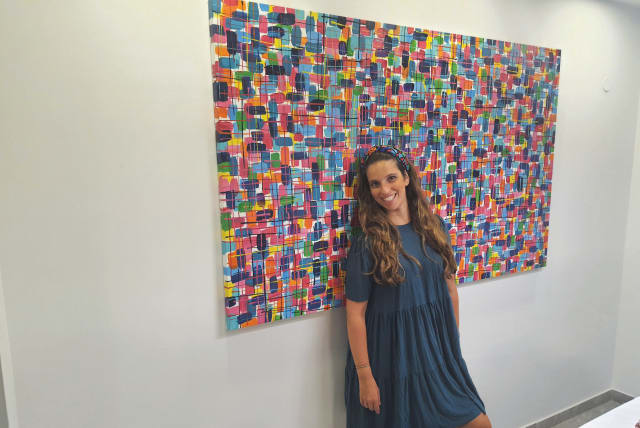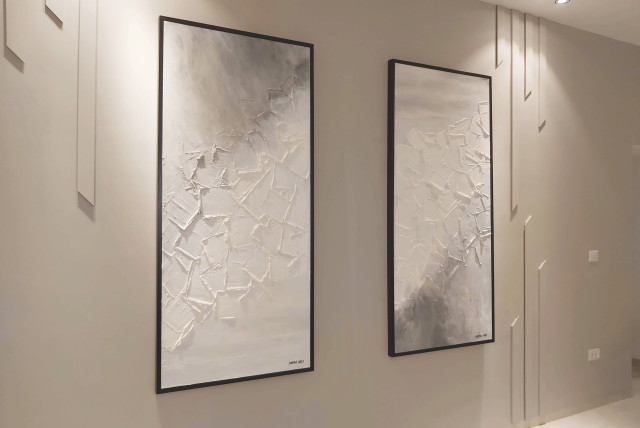'Pixels of Love'

Brazilian-Israeli artist works to raise support for October 7 victims
Sandra Gross, a 35-year-old abstract artist, for the first two months of the war felt completely blocked and couldn’t paint.
Like many Israelis, she felt a need to help the country, so she volunteered to cook for soldiers. Having made aliyah from Brazil at age 22 – for Zionist reasons, she emphasizes – she felt she must help Israel the best way she could. For a moment, her work was put on hold. 
Gross, who made a switch from marketing to an artistic career in 2021, has been very active and productive in the past few years. “I was painting about five paintings a month and selling them,” she says. Although art had always been present in her life as a hobby, during her maternity leave with her second daughter (when she found time for painting), it unexpectedly changed to a profession.
Asked when she started to feel that she was an artist, Gross replies: “When I started to sell my paintings.” And that happened pretty quickly. After she posted pictures of her work on social media, one of the owners of a central Jerusalem art gallery contacted her.
Gross couldn’t believe that soon after, her paintings were hung next to works of established artists. “I had been told that I needed years of experience to be represented by a gallery, so I was not even trying to contact any.” That was a turning point for Gross. She started to think of herself as an artist, and that gave her the courage to contact other galleries. “Now, besides the Jerusalem one, I work with two more galleries in Tel Aviv.”
Since then, she had a solo exhibition called “Colors of Light” in Petah Tikva, her current hometown, and has taken part in some group exhibitions. In recent months, she has taken part in two. One is “Am Israel Chai,” presented by The Israeli Art Market online gallery until the end of January. According to the gallery website, 50% of the sales proceeds will be donated to support families of the October 7 kidnapped and victims; the Supernova music festival survivors; the evacuated families; children with traumas; and elderly people with health issues. The second one is “My Victory Picture – Exhibition of Artists Full of Hope,” which will open on January 25 at the Beit Amergad Gallery in Petah Tikva. According to the Facebook page, 50% of the proceeds will be donated to the victims of the war.
A focus on abstract art
So far, Gross has been focusing on abstract art, with mixed media on canvas and plexiglass. Her pieces are a mix of texture and vibrant colors, often consciously creating a 3D effect. “I like to work in different techniques,” she explains. “I create three types of art: acrylic paint on canvas, and plexiglass. I use transparent plexiglass, two to three layers, to build a 3D effect; and texture on canvas, [where] I use modeling paints and fabric. When I paint on canvas or plexiglass, I like to make things very colorful. But when I work with texture, it is usually monochromatic, in one color.”
Why plexiglass? “I think plexiglass is very modern, very actual, and it is very unique.”
Her works are very optimistic. But since the war started, all has changed. After the first two months of being unable to paint, it took her some time to go back to the studio. In a departure from her abstract works, she focused on something completely new and useful: candlesticks and hanukkiot.
At the end of November, she posted on one of the Facebook groups: “Like many of us, I saw myself with almost no job... and I decided to embrace this challenging time and lots of free time (unfortunately) to start a new journey. I created Judaica and art items on plexiglass. I poured my heart into this collection to not only express my journey but also to find strength. Your support is more meaningful than ever – I would love to hear what you think about my art.”
She says there is something more to the Judaica: “I think that during the war, people started to become more linked to Judaism. Me, too. We don’t have anyone to trust other than ourselves, the Jews. We need to stick together, and these emotions made me, an abstract artist, create something specifically connected to Jews and [our] religion.” The Shabbat candlesticks were the first. “People who never lit Shabbat candles now started to do so with my candlesticks.” She felt as if by making Judaica, she became a part of this wave.
GROSS GREW up in a traditional Jewish home in Sao Paulo, Brazil. “I became more religious when I made aliyah, but I was always a Zionist,” she underlines. As a teenager, she was involved in Bnei Akiva [Religious Zionist youth movement].
In 2008, three years before her aliyah, she participated in a six-month Bnei Akiva program in Israel. “I worked at a kibbutz, I studied in a midrasha [Jewish educational program for women], I volunteered at Magen David Adom. We also traveled around Israel and visited a lot of museums to learn the history of Israel. It was a very Zionist program, and after that I decided I wanted to move here.”
Her parents, immigrants from France and Lebanon, didn’t like the idea of having their daughter so far away from Brazil, but that didn’t change her mind. After obtaining her degree in marketing, she moved to Israel. Two years later, she married a new immigrant from Belgium, Steve. They live in Petah Tikva with their two daughters – Maya, five; and Naomi, three.
For the first 10 years in Israel, Gross worked in marketing. “I always loved painting, but I didn’t think it would be enough to make a living from it.” Surprisingly, the six months of her maternity leave in 2021 gave her time and space in her life to paint. “When Naomi was born, I bought the first big canvas,” she says.
Gross left her work in marketing, but her marketing skills helped her to turn her hobby into a profession, with a very modern attitude. In the same year, she opened her business, Sandra Gross Art, which revolved around her passion for art.
She works with interior designers and with private clients on commission. But beyond the commercial side, she enjoys the most creative part of her work. “Selling is very important, but the creative process is what I enjoy. There is nothing [like] when I create something and I like the result.”
Gross likes to work on her art in the late morning hours, between 10 and 12. “I like to put on Brazilian traditional music and start painting.” The songs take her back to her early years in Brazil.
At least that was the way she worked until October 7.
Like many Israelis, she had to adjust to the new, not easy situation of ongoing war. As an artist, Gross is finding her new direction in art, creating Judaica, but she is not giving up on abstract art. She also makes new plans: “Next, I am going to work on metal and aluminum,” she says.
This artist is full of ideas, just like the multi elements in her painting Pixels of Love, and this harrowing war will not stop her. ■
www.sandragrossart.com
SANDRA GROSS FROM SAO PAULO, BRAZIL TO PETAH TIKVA, 2011
Jerusalem Post Store
`; document.getElementById("linkPremium").innerHTML = cont; var divWithLink = document.getElementById("premium-link"); if (divWithLink !== null && divWithLink !== 'undefined') { divWithLink.style.border = "solid 1px #cb0f3e"; divWithLink.style.textAlign = "center"; divWithLink.style.marginBottom = "15px"; divWithLink.style.marginTop = "15px"; divWithLink.style.width = "100%"; divWithLink.style.backgroundColor = "#122952"; divWithLink.style.color = "#ffffff"; divWithLink.style.lineHeight = "1.5"; } } (function (v, i) { });

